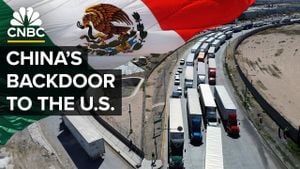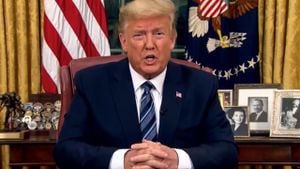Lars Klingbeil, the leader of the Social Democratic Party (SPD), is set to usher in significant leadership restructuring following the party's stunning electoral defeat, marking its worst performance since 1887. With recent results indicating around 16% of the votes, the SPD now grapples with the aftermath of this unprecedented loss, leaving behind questions about its direction and future.
The dismal results came during the 2025 Bundestag elections, which saw shattered expectations for the ruling party. Klingbeil characterized the outcome as "eine Zäsur"—a decisive turning point—for the SPD, signaling the urgency for change within the party’s ranks. He emphasized, "Dieses Ergebnis wird Umbrüche erfordern in der SPD," highlighting the need for both generational and ideological shifts.
Rolf Mützenich, the current parliamentary group leader, announced his support for Klingbeil's leadership ambitions after overseeing the disappointing results. Writing to party members, he commented on the necessity of younger leaders taking the reins to guide the SPD through this uncharted territory. His correspondence reflects the somber reality the SPD faces: "Wo ich konnte, habe ich mit Standfestigkeit und Haltung versucht, die Dinge zu verbessern und Rückschritt aufzuhalten," he stated, acknowledging the collective responsibility of the party's leadership.
Olaf Scholz, the outgoing Chancellor, expressed his remorse over the election debacle but reaffirmed his commitment to the SPD, insisting, "Ich werde dieses Amt bis zum letzten Tag ausüben," pledging to lead the party until his term's end. The mood at the SPD headquarters was characterized by disbelief and disappointment, as party members attempted to come to terms with the heavy loss.
The fallout from the election necessitated immediate discussions about strategic and structural changes. Klingbeil outlined plans for the SPD to return to its roots as the "Volkspartei der linken Mitte"—a people's party of the left center—underscoring the importance of reconnecting with its core base to regain credibility and voter support. "Der Generationswechsel in der SPD muss eingeleitet werden," Klingbeil declared, advocating for younger leadership to steer the party back on track.
With the political equation dramatically shifted, the SPD's traditional rivals are now poised for potential dominance. The rapid rise of the AfD has left the SPD grappling for relevance, and their past identity as the ruling party hangs by a thread. The electoral projections revealed not only the SPD's shortcomings but suggested broader complications for coalition-building as both the FDP and BSW teeter near the electoral threshold.
These complications were evident as party members monitored the rapidly changing projections and discussed strategies during tense exchanges at the SPD headquarters. A visible unease permeated the air as party leaders calculated the ramifications of their internal disagreements against the backdrop of their historical defeat.
Looking to the future, Klingbeil draws inspiration from the necessity of unifying leadership within the party. He expressed hope for collaboration among fellow party members, emphasizing the importance of collective action: "A geschlossen SPD bleiben," indicating the importance of unity going forward.
The upcoming week will be pivotal for the SPD as the proposed changes, including Klingbeil's ascent to parliamentary leadership, begin to form. The SPD stands at a crossroads, where every decision could dictate the course of their strategies and establish new ties within the German political framework.
While uncertainty looms large, Klingbeil’s candidness and intent to blend generational renewal with experienced guidance may be just what the SPD needs to navigate through these turbulent waters. This historic moment asks all SPD members, from long-established leaders to the next generation, to engage vigorously—and creatively—in shaping the future.
Overall, the SPD finds itself reeling from electoral turmoil, yet gripping tightly to the threads of hope and necessary reform. Their next steps could either restore their standing or push them to the periphery of German politics.



